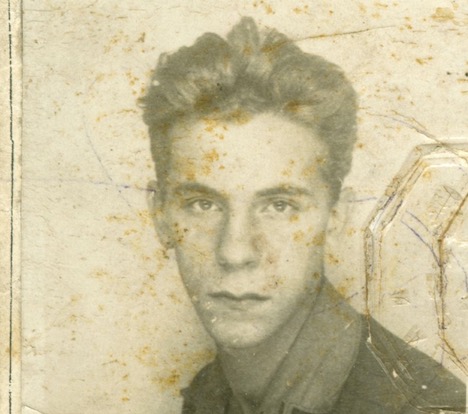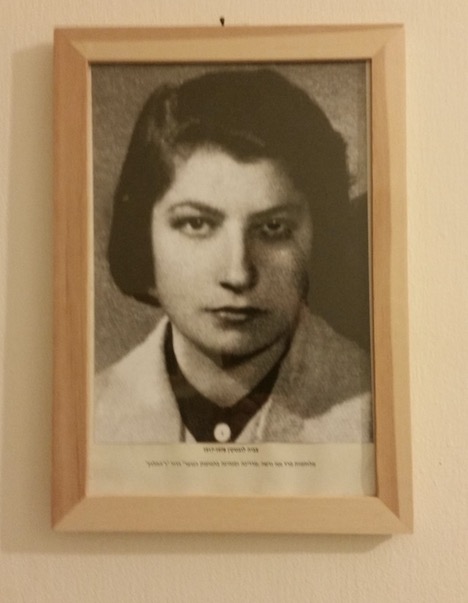The Holocaust, vengeance and the Palestinians
 Print This Print This
By Philip Weiss | Mondoweiss
Mondoweiss
Thursday, Oct 4, 2018
 |
| Zalman Frydrych, from the Jewish Historical Institute in Warsaw |
For Jews 50 and older, there is only one collective memory. It was given to me when I was little, when my mother told me about the Jews hiding in attics and wardrobes and behind false walls as they heard the boots of the Gestapo coming up the stairs, to collect Jews for transport to the extermination camps. It did not matter that the actual memory was not my mother’s or mine. This had happened to us, the Jews. She’d been a girl when the news had broken in the U.S. The memory was fresh, and ours to carry.
Growing up, I wanted nothing to do with the memory. It didn’t characterize my experience; and it felt like a burden, a reason not to engage with non-Jews or to marry one, or even to do American things, like camping and construction. Why not? Because of the boots on the stairs. What we owed the collective and the millions lost in Europe. No thanks, I said, I have to make my own life.
My outlook changed in May when I went to Warsaw. Actually seeing the scene of the boots and the scant memorials to its existence was disturbing; and when I got home I began reading Warsaw memoirs. I’m on my tenth now. In my 60s, I want to know as much as I can about what Warsaw’s Jews went through. So many of them were similar to me, secular intellectual laborers, cultured urban moderns– going through an unending nightmare.
One surprise of these memoirs was a simple one that probably should have been obvious. The remnant of Jews who survived the ghetto liquidation in 1942 and who undertook the noble doomed uprising in 1943 had an overriding motivation: They wanted revenge.
Vengeance was cited in the (thrilling) announcements of the ghetto uprising:
“[T]hough we may perish in this struggle… we breathe as you do with a thirst for vengeance and punishment for the crimes of our common enemy.” –Jewish Fighting Organizations, April 23, 1943.
“At least let the world know that these are the last agonizing days… Perhaps some day there will be vengeance.” — Bund announcement.
The vengeance theme runs through all the memoirs as well. From the beautiful book by Vladka Meed,
“Deep in every heart, bringing us ever closer together, lay the yearning for vengeance, for our families taken to the death camps, for the wrongs and sufferings we ourselves had borne…
“The ghetto had been the soul of our entire struggle… We clung together, united by a burning drive — for vengeance!”
Even Czeslaw Milosz, the non Jewish poet on the “Aryan” side of the wall, wrote: “The gas chambers and crematoria… cry out to the heavens for vengeance.”
You can understand this. Vladka Meed had watched her mother, brother and sister taken off to the train at the north end of the ghetto after escaping selection after selection. The ghetto hero Zalman Frydrych, a Bundist, had brought news of the Treblinka death camp to Warsaw, lost his wife (who died in Majdanek) and handed over his daughter to a convent that he could not know the name of, lest he give it away under torture. The girl survived. Frydrych was killed in the forest in 1942 while rescuing other Jews. The Zionist hero Yitzhak Zuckerman and his wife Zivia Lubetkin both survived, but Zuckerman had lost his entire family in Vilna. You’d want to kill the Nazis too.
 |
|
Zivia Lubetkin, Warsaw Ghetto heroine, picture in Niran kibbutz in occupied territory, Jordan Valley, Palestine. |
Even as they plotted the glorious uprising and appealed for guns and refuge and reinforcement from the Polish underground, the Jews of Warsaw were abandoned. They were on their own. Yes, there were many gentiles who heard the gunfire on the other side of the wall and understood the moral consequences, and many who sheltered Jews too on the Aryan side, but few lifted a finger during the uprising, lest they lose their lives.
It might be said that among older Jews there is no such thing as politics per se so much as, How close is a person to this spirit of lonely vengeance. Dov Hikind lost his grandparents in the Holocaust. Doug Feith the neoconservative lost his uncles and grandparents. Meir Dagan an Israeli Mossad director had a photograph on his office wall of his slaughtered grandfather. My first neoconservative Eric Breindel’s parents had barely escaped Germany. These people had reasons to base their politics in the belief that the world was indifferent to the Jews, and in a faith in Jewish power.
What justice was there for the remnant? My sense is that there was a lot of monetary compensation, but it was hardly sufficient. The criminals of the Nazi occupation of Poland were not repaid for their crimes. The Warsaw ghetto memoirs overflow with pride at the success of the Molotov cocktails and rifles and mines that the Jews loosed on the Nazis in April and May 1943, and at how many Nazis were killed; but the Jews paid dearly. The uprising was a great victory because it was just a lot better than going quietly to the trains to Treblinka. “I must stay and teach them a lesson!” Yurek Blones said– and within days he was dead, and the ghetto smoking rubble.
After the liberation, there were efforts to make individual Nazis pay with their lives for their crimes (Ronen Bergman documents some of these killings); and the trial of Eichmann in Jerusalem in 1961 came out of that impulse. If I had lost my mother or sister or wife, I’d have been standing outside that courtroom. But in any real measurable sense there was scant justice for the victims. Maybe that is the character of history.
Eichmann’s trial took place in Israel; and Israel itself was the world’s idea of compensating the Jews for what they had undergone in Europe. Israel fulfilled “the debt …. the world owes the Jewish people in the wake of the Nazi genocide,” Aaron David Miller puts it. Obama said as much in the Cairo speech: Israel was justice for the Holocaust. Then religious Zionists including David Frum later corrected him, and said it was promised to us by God. But we all know that this is why Israel exists, as an answer to European antisemitism.
That was a mistake: to make Palestinians pay for European crimes. Palestinians say so all the time. Still, the sense of solemn obligation is why western governments and elites are so committed to the two state solution even now, and so indifferent to the Nakba. The Holocaust made the west Zionist.
The Warsaw ghetto memoirs have helped me to understand the viciousness of the Israeli response to Palestinian resistance. The Jewish collective memory demanded a vengeful response to the Holocaust. The Nazis deserved some taste of what we had experienced at their hands. We were not able to achieve that satisfaction.
We displaced those feelings on to the Palestinians. The desire for vengeance justifies slaughtering innocent protesters on the Gaza border, denying millions freedom of movement, and dimming the future of millions of young people in East Jerusalem and Israel. The Palestinians are going to have to suffer for a long time. They need to hear those boots on the stairs.
Source URL
|
 Print This Print This

|

